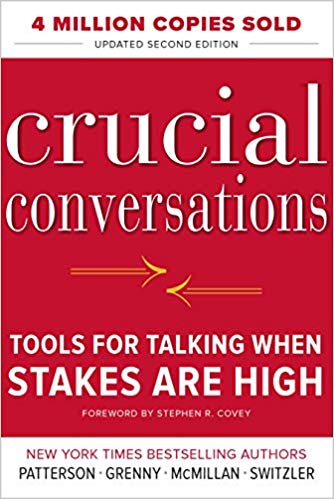

This article is an excerpt from the Shortform summary of "Crucial Conversations" by Kerry Patterson. Shortform has the world's best summaries of books you should be reading.
Like this article? Sign up for a free trial here .
Are you worried about how to go about the crucial conversations in your life? Can crucial conversations training exercises help?
While a crucial conversation will always be difficult, these crucial conversations training exercises can help you practice your communication skills, and prepare for the tough conversation ahead. Crucial conversations don’t have to be painful; try these five exercises first.
Crucial Conversations Training Exercises
These crucial conversations training exercises focus on some of the core elements of having crucial conversations. By using these exercises, you can improve your communication skills and prepare yourself for future crucial conversations.
Crucial Conversations Training Exercise 1: Your Crucial Conversations
The first of the crucial conversations training exercises helps you understand what a crucial conversation is. A crucial conversation is a discussion characterized by high stakes, differing opinions, and strong emotions. Your skill in handling these conversations directly affects your success at work and in your personal relationships.
Think of a crucial conversation at work that you’re avoiding or not handling well. How could handling it successfully boost your career?
Think of a recent crucial conversation in your relationship. How would you grade yourself on the way you handled it? How would improving your dialogue skills benefit your relationship?
Are certain conversations that haven’t gone well bothering you? Which ones would strengthen your health and well-being if you handled them better?
Crucial Conversations Training Exercise 2: Monitoring Yourself
You can get so involved in the content of an intense conversation that you lose track of what you’re doing and how others are reacting (your brain disengages and your emotions predominate). For conversations to be successful you need to pay attention to both the content and the conditions, so you can adjust if a dialogue goes off track.
Think about some of your toughest conversations. What were the cues (physical, emotional, behavioral) that your brain was beginning to disengage, and your emotions were driving you away from dialogue?
How can you respond to those cues in the future to stay in a constructive conversation?
What is your style under stress? When conversations become heated, do you typically respond with silence (withdrawing) or violence (becoming verbally aggressive)? Give an example of a recent crucial conversation where you behaved that way.
Taking cues from the chapter, what could you do differently under stress? This is one of the crucial conversations training exercises that you can apply to your own personal experience, and can help you navigate conversations going forward.
Crucial Conversations Training Exercise 3: Finding a Mutual Purpose
Sometimes we end up in a debate because we have different purposes or goals. The best approach is to stop debating, back up, and create a mutual purpose. (The CRIB steps — Commit, Recognize, Invent, Brainstorm — may help.) Acronyms are very useful, and if they’re not already available, you can apply them to your crucial conversations training exercises.
Think of a crucial conversation that you need to have in your relationship. Do you have a mutual purpose – do you agree on what you want to see happen? If so, what is it?
If you’re at odds on a purpose, consider what you and your partner each want. (For instance, if you disagree about how to manage your bank account, what do you each want in the short term? Maybe you want to go out and have fun to relieve stress, but your partner wants to curb spending ensure there’s always enough money to pay bills and handle emergencies.)
Next, consider something you can agree on that you both really want long-term. (For instance, maybe you both want to avoid the stress and limitations of having bad credit.)
What strategy will enable you to achieve this mutual purpose and get what you each want in the short term? (For instance, agreeing on a monthly entertainment budget so you can have fun but also not exceed your bank account.)
Crucial Conversations Training Exercise 4: Making Contrasting Statements
Practicing contrasting statements is one of the important crucial conversations training exercises. When someone in a crucial conversation mistrusts your motives, you can use the technique of contrasting to help reassure them and get the dialogue back on track. You do it by first stating what you don’t want or intend, followed by what you do want.
Think of a touchy conversation you’re reluctant to have because you’re concerned the other person will get the wrong impression. Write a contrasting statement that you could use to reassure the person.
Crucial Conversations Training Exercise 5: Master Your Story
When we see and hear something that affects us, we tell ourselves a story explaining what happened, which then drives how we feel and behave. This can be counterproductive, but we can change our stories and therefore our emotions.
Think of a time when you felt very strongly about something someone said or did. What story did you tell yourself to generate your feelings?
Was it a clever story? What type — a victim, villain, or helpless story? How did you feel as a result?
Go back to the beginning and review the observable facts (what you saw and heard). Did you omit something about your own role? What alternative story could you tell based on the facts?
Crucial conversations are crucial for a reason; without them, you miss out on real communication. These crucial conversations training exercises can help you prepare for difficult talks, and you can come back to them any time you need to practice or build confidence.

———End of Preview———
Like what you just read? Read the rest of the world's best summary of Kerry Patterson's "Crucial Conversations" at Shortform .
Here's what you'll find in our full Crucial Conversations summary :
- How to approach an argument without getting mad
- The mistakes most people make when trying to listen to someone else
- How to come up with win-win solutions that make everyone happy






